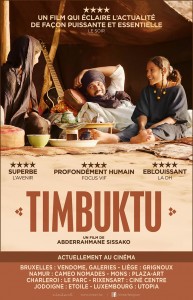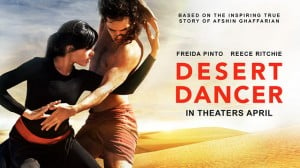I stepped into a cozy loft, decorated minimally with Moroccan style tapestry and into an experience I won’t easily forget.
The Light in Her Eyes, a documentary film following the story of Houda al-Habash, the founder and teacher of an all girls’ Qur’an school in Damascus, Syria, sparked my interest about a year ago where, in a similar intimate gathering, I was first able to see the footage gathered.
I must admit I was skeptical, even after meeting the charming directors, Julia Meltzer and Laura Nix. I initially thought to myself, here we go again with white women telling our story. I was waiting for the Orientalist slant, the reek of privilege or the saving campaign.
But I found none of that. What I did find, however, was a thought-provoking film made by filmmakers who seemed to be passionate about their subjects, deferential towards the delicate framework of sociocultural norms they were operating from within and cognizant of the sociopolitical impact of media, especially of those whose subjects are Muslim women.
The documentary follows focuses on the stories of three Syrian Muslim women: Houda al-Habash, her daughter Enas, and a 14-year-old student at the girls’ school named Riham.
Houda is a Muslim preacher who founded Al-Zahra Qur’an school for girls when she was just 17 years old. The school teaches the girls about Islam and encourages them to memorize the Qur’an, pursue higher education and to seek employment, but also, to value their roles wives and mothers.
The filmmakers have said about their film that, “As women directors, we recognize how Houda’s message both speaks to and departs from our version of feminism. Our film embraces this contradiction, committed to both questioning and celebrating the impact of her vision—expanding women’s opportunities through Islamic education.”
This candid look at what is being termed by academics such as Saba Mahmood as “the women’s mosque movement,” has significant implications for the sociocultural landscapes of the countries where it is occurring in. What is surprising is that this movement has been in evolving for thirty years in the Middle East and more recently in the U.S., yet there is hardly any awareness of it.
As I sat among a group of largely non-Muslim, Caucasian Americans to view this film project, I was curious as to how they would respond. Would this depiction of Muslim women spark the discourse my ears have grown tired of or would a new discourse emerge-one built upon curiosity instead of assumptions and illumination rather than fear?
What emerged is this idea of transforming the traditionally male-dominated space of the mosque into a women-dominated space as a constructive endeavor rather than a scary one. This Islamic revival of sorts has allowed these women the ability to understand and disseminate Islamic legal texts which are traditionally exclusively translated into laws by men. They are gaining a tool in which they can begin to challenge the existing fiqh (understanding) regarding gender roles and other topics relevant to their lives.
Additionally, these women, both young and old, are learning to create bonds which disregard social class and particular familial or cultural traditions in favor of one which finds commonality in piety.
Houda al-Habash says in the film that it is not Islam that has deprived women rather, “Muslims themselves have deprived women of everything.”
Professor of Anthropology at the University of California, Berkley, Saba Mahmood, who was amongst those present at this intimate screening, noted that this movement is one that is critical of the militant trend. It allows women to be a part of the social life of a mosque. What she also mentioned is that this is not a feminist movement, nor is it an anti-feminist movement. Its goal is piety and it should not be judged from within an existing framework of feminist or anti-feminist discourse.
When asked if fear or alarm is justified as a response to this movement, an interesting conversation emerged. The film reminds viewers that religion is not an anti-modern force, rather it challenges the notions of what we think of as feminist, anti-feminist, democratic, pluralistic, private, public, modern and traditional.
Lastly, as I sat there listening to the responses, I heard something beautiful. A sentiment emerged that Muslim women were no longer seen as “the other,” but rather they were seen as sharing in this “double-bind” of juggling family and careers. They were no longer valued as pawns played by white and brown men, but as autonomous and empowered. They were no longer seen as distant, hidden, scary, or oppressed nor were they painted with any other broad stroke.
The Light in Her Eyes candidly tells a story which began long before the Arab Spring sprung, one which has implications for women in the Arab world post-revolution and one which will continue to challenge the existing discourse surrounding Muslim women.
Note: The Light in Her Eyes is awaiting final editing and post-production, but the project is in need of further funding. The filmmakers have launched a kickstarter campaign to raise funds. Click here to donate to this project by Sept. 10th, 2011.













